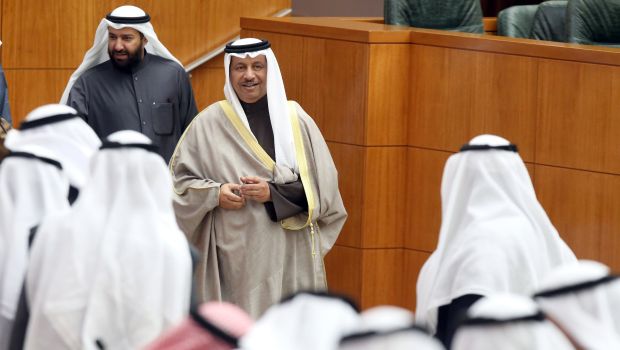
Kuwaiti Prime Minister Sheikh Jaber Al-Mubarak Al Sabah (C) and newly appointed Kuwaiti Oil Minister Ali Al-Omair (L) arrive at the Abdullah Al-Salem hall in Kuwait's National Assembly to attend a parliament session in Kuwait City on January 7,2014. (AFP PHOTO/YASSER AL-ZAYYAT)
London, Asharq Al-Awsat—Seven Kuwaiti ministers, including new oil and finance ministers, were sworn in following the 34th cabinet reshuffle since the country’s independence in 1961, taking the oath of office before parliament on Tuesday.
Monday’s reshuffle saw Ali Al-Omair being appointed as the country’s new oil minister, replacing Mustapha Al-Shamali, who had held the post from August 2013. According to Kuwait’s state news agency, KUNA, Omair holds a PhD in analytic chemistry from the University of Kent. He has been a lawmaker since 2006 and is a member of the Salaf Alliance.
Hind Sabeeh Al-Sabeeh was appointed Minister of Social Affairs and Labor and Minister of State for Planning and Development. She is the only woman in the cabinet.
Commerce and Industry Minister Anas Khaled Al-Saleh was moved to head Kuwait’s Finance Ministry, replacing Sheikh Salem Abdulaziz Al Sabah. Former oil minister Abdulmohsen Al-Madaj was appointed the new Minister of Commerce and Industry.
Ali Saeed Al-Obaidi was appointed as health minister, replacing Sheikh Mohammad Al-Abdullah Al Sabah. Obaidi briefly held the post of Minister of Health in 2012.
Nayaf Mohammad Al-Aimi was appointed Kuwait’s Minister of Justice and Minister of Awqaf (Religious Endowments) and Islamic Affairs, replacing Sherida Al-Maousherji. Aimi is also a member of the Salaf Alliance.
This is the sixth government to be led by Prime Minister Sheikh Jaber Mubarak Al-Hamad Al Sabah. The reshuffle comes after the previous government resigned last month prior to a planned parliamentary questioning of some ministers and amid questions over the legality of the country’s 2013 parliamentary elections.
On the same day as the resignations, Kuwait’s constitutional court ruled that the parliamentary elections were legal, dismissing lawsuits that could have led to the dissolution of parliament and a fresh round of elections.
In addition to the oil portfolio, Salaf Alliance members also head the Ministries of Health, Islamic Affairs and Justice, and Communication.
All the ministers who had been scheduled to be questioned by parliament were excluded from the new government.
